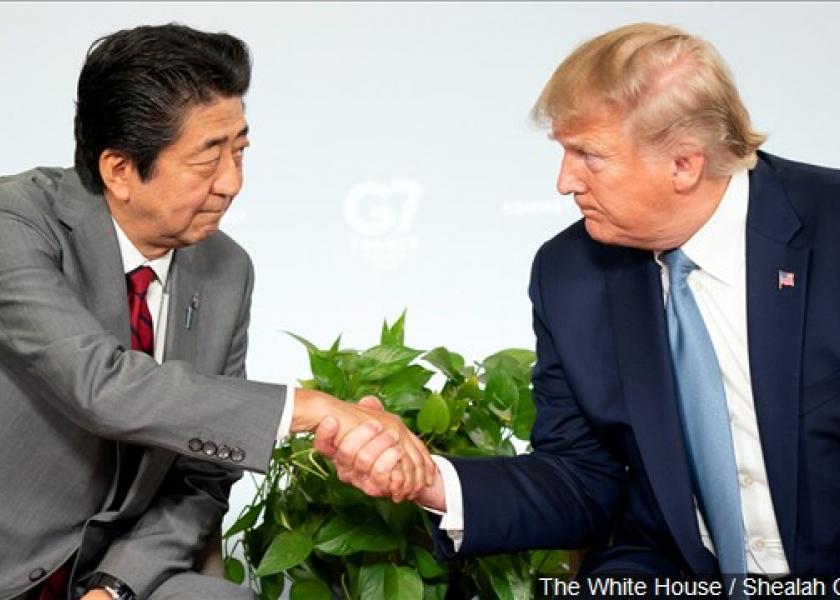Trump, Abe Tout Progress on Limited Trade Deal Lowering Tariffs

(Bloomberg) -- Donald Trump and his Japanese counterpart Shinzo Abe touted progress toward a limited trade agreement on Wednesday, but the U.S. president stopped short of publicly withdrawing his threat of imposing auto tariffs.
A key sticking point in the more than year-long talks was Abe’s need for a guarantee that Trump will not impose national security tariffs on imported Japanese autos and auto parts.
Trump and Abe signed the “first stage” of an initial trade pact after meeting Wednesday at the United Nations General Assembly. In an emailed statement, the U.S. Trade Representative’s office described the agreement as “early achievements.”
Trump told reporters that the leaders were taking a step toward “a fair and reciprocal trade agreement.”
“In the fairly near future we’re going to have final comprehensive deals signed with Japan,” he added.
Trump, who faces re-election next year, is eager to make a deal with Japan to appease U.S. farmers who have been largely shut out of the Chinese market as a result of his trade war with Beijing.
Trump, seated next to Abe, told reporters the trade deal between the two countries will help U.S. farmers by opening up Japan’s agricultural market. The deal will eliminate or reduce tariffs on $7.2 billion of U.S. food and agricultural products, helping U.S. beef, corn, pork and other farmers, the USTR said in a statement.
“These are really big dollars for our farmers and for our ranchers,” Trump said.
The president said the deal, which also covers a $40 billion digital trade agreement, would help reduce a “chronic” U.S. trade deficit.
Trump said the two countries are continuing to negotiate “other areas of interest” and that “in the very near future” additional deals would be announced.
Auto Pledge
Abe’s top priority is to win a pledge that the U.S. won’t slap fresh tariffs on Japanese automobile exports, a cornerstone of the country’s economy. Removing the threat would relieve uncertainty after months of slowing trade and just ahead of an Oct. 1 sales tax hike that poses a fresh risk to the economy.
The two sides had agreed that no such tariffs would be imposed during the talks and Motegi told reporters Monday he didn’t believe that the issue should cause concern.
Berating the world’s third-largest economy for its trade surplus with the U.S. had been among Trump’s favored themes since his election campaign.
The delay in signing the actual deal has been caused in part by the need for lawyers on both sides to vet the language. But the president and his freewheeling style of governing have also emerged as an issue, with Japan eager to make sure it can withdraw market access from the U.S. if Trump changes his mind abruptly and goes ahead with threatened auto tariffs.
The proposed deal won’t lower the barriers protecting Japan’s rice farmers -- something Abe could use to help smooth its course through parliament, where it must be ratified before coming into effect.
© 2019 Bloomberg L.P.







